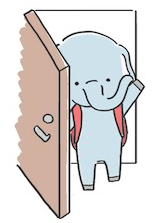アメリカやカナダでは、レストランやホテル、タクシーなどでチップを渡すのは当たり前ですが、日本には「チップ文化」がありません。
とはいえ、「日本人はチップをもらっても喜ばない」というのは誤解です。
実際には、日本でもチップ(現金)をもらって喜ぶ人は多く、「怒られる」というのはかなり誇張です。
ただし、多くの接客業では「公にはチップを受け取らない」「表向きは断る」という文化や社内規則があります。
そのため、外国人から見ると「受け取らない文化」に映ることもあります。
例えば旅館では、布団を敷きに来た仲居さんに現金を手渡すと、一度は「お気持ちだけで十分です」と断るかもしれません。
しかし、小さな封筒(ポチ袋)に入れて「心づけです」と伝えれば、ほとんどの場合は笑顔で受け取ってくれます。
また、日本ではお金をそのまま渡すのは失礼とされるため、封筒やのし袋(コンビニでも購入可能)を使うのが一般的です。年明けなら「お年玉袋」を使うのも、日本らしい粋な渡し方です。
長距離タクシーで親切に観光案内までしてくれた運転手さんや、ホテルで特別な手配をしてくれたスタッフなど、心から感謝を伝えたい時にチップを渡すと、とても喜ばれます。 日本では、チップは義務ではなくサプライズ。
だからこそ、うまく渡せばその場が一層あたたかい空気に包まれ、思い出も特別なものになります。
次に日本を訪れるときは、現金だけでなく「ありがとう」の一言も忘れずに。
それでは、また次回のJapanese-Onlineニュースレターでお会いしましょう!
ご意見・ご感想もぜひお寄せください。

sign up for the Japanese-Online Newsletter
__..-・**・-..__..-・**・-.._ あいうえお かきくけこ さしすせそ たちつてと なにぬねの はひふへほ まみむめも やいゆえよ らりるれろ わゐうゑを ん __..-・**・-..__..-・**・-.._
#JapaneseOnline #LearningJapanese #FreeJapaneseLessons #JapaneseVideoLearning #JapaneseAnime #Anime #JapaneseFood #Bloguru
とはいえ、「日本人はチップをもらっても喜ばない」というのは誤解です。
実際には、日本でもチップ(現金)をもらって喜ぶ人は多く、「怒られる」というのはかなり誇張です。
ただし、多くの接客業では「公にはチップを受け取らない」「表向きは断る」という文化や社内規則があります。
そのため、外国人から見ると「受け取らない文化」に映ることもあります。
例えば旅館では、布団を敷きに来た仲居さんに現金を手渡すと、一度は「お気持ちだけで十分です」と断るかもしれません。
しかし、小さな封筒(ポチ袋)に入れて「心づけです」と伝えれば、ほとんどの場合は笑顔で受け取ってくれます。
また、日本ではお金をそのまま渡すのは失礼とされるため、封筒やのし袋(コンビニでも購入可能)を使うのが一般的です。年明けなら「お年玉袋」を使うのも、日本らしい粋な渡し方です。
長距離タクシーで親切に観光案内までしてくれた運転手さんや、ホテルで特別な手配をしてくれたスタッフなど、心から感謝を伝えたい時にチップを渡すと、とても喜ばれます。 日本では、チップは義務ではなくサプライズ。
だからこそ、うまく渡せばその場が一層あたたかい空気に包まれ、思い出も特別なものになります。
次に日本を訪れるときは、現金だけでなく「ありがとう」の一言も忘れずに。
それでは、また次回のJapanese-Onlineニュースレターでお会いしましょう!
ご意見・ご感想もぜひお寄せください。
What Happens If You Tip in Japan?
In the U.S. and Canada, tipping at restaurants, hotels, and even taxis is common. However, there isn’t a tipping culture in Japan.
Don’t be mistaken–there’s a misconception that Japanese people don’t appreciate tips.
Many people in Japan are actually happy to receive a cash tip, and the idea that they’ll scold you for it is a big exaggeration.
However, in many customer service industries, not officially accepting tips or politely declining them at first exists as a culture or company policy in Japan. Foreigners may see this as Japan having a culture of not accepting tips.
For example, a housekeeper at a traditional inn (ryokan) might politely refuse a cash tip at first, but if you place it in a small envelope (pochibukuro) and say, "This is a small token of my appreciation (kokorozuke-desu)," most will happily accept it with a smile.
In Japan, handing over bare cash is considered impolite, so using a decorative envelope or noshibukuro is common (available at convenience stores). Around New Year’s, using an "otoshidama bag" (a special envelope for New Year's money gifts) is a uniquely Japanese and thoughtful way to give a tip.
If a taxi driver gave you a thoughtful tour on a long-distance ride, or a hotel staff member made a special arrangement for you, offering a tip along with your thanks will be greatly appreciated.In Japan, a tip is not an obligation but a pleasant surprise.
That's why, when done right, it can make a moment even more special and create a truly warm memory.
So next time you visit Japan, don’t forget to offer not just money, but also a heartfelt “thank you.”
We look forward to seeing you in the next issue of the Japanese-Online Newsletter.
We’d love to hear your thoughts and feedback!
Don’t be mistaken–there’s a misconception that Japanese people don’t appreciate tips.
Many people in Japan are actually happy to receive a cash tip, and the idea that they’ll scold you for it is a big exaggeration.
However, in many customer service industries, not officially accepting tips or politely declining them at first exists as a culture or company policy in Japan. Foreigners may see this as Japan having a culture of not accepting tips.
For example, a housekeeper at a traditional inn (ryokan) might politely refuse a cash tip at first, but if you place it in a small envelope (pochibukuro) and say, "This is a small token of my appreciation (kokorozuke-desu)," most will happily accept it with a smile.
In Japan, handing over bare cash is considered impolite, so using a decorative envelope or noshibukuro is common (available at convenience stores). Around New Year’s, using an "otoshidama bag" (a special envelope for New Year's money gifts) is a uniquely Japanese and thoughtful way to give a tip.
If a taxi driver gave you a thoughtful tour on a long-distance ride, or a hotel staff member made a special arrangement for you, offering a tip along with your thanks will be greatly appreciated.In Japan, a tip is not an obligation but a pleasant surprise.
That's why, when done right, it can make a moment even more special and create a truly warm memory.
So next time you visit Japan, don’t forget to offer not just money, but also a heartfelt “thank you.”
We look forward to seeing you in the next issue of the Japanese-Online Newsletter.
We’d love to hear your thoughts and feedback!
sign up for the Japanese-Online Newsletter
__..-・**・-..__..-・**・-.._ あいうえお かきくけこ さしすせそ たちつてと なにぬねの はひふへほ まみむめも やいゆえよ らりるれろ わゐうゑを ん __..-・**・-..__..-・**・-.._
#JapaneseOnline #LearningJapanese #FreeJapaneseLessons #JapaneseVideoLearning #JapaneseAnime #Anime #JapaneseFood #Bloguru

